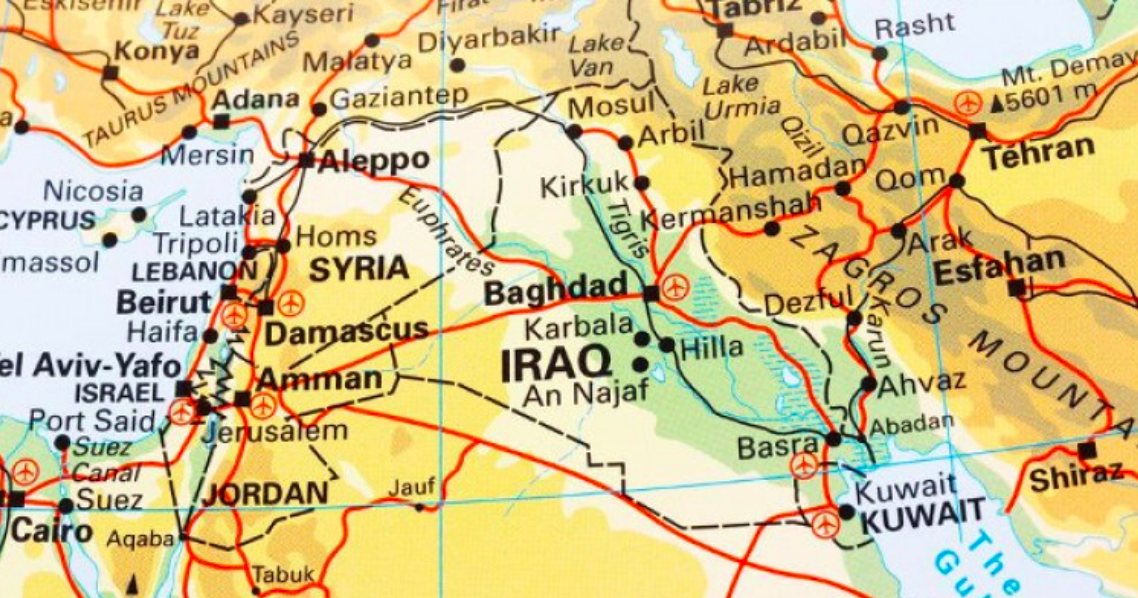Iran, Yemen and Türkiye hit US-Israeli targets in the region. Resistance organizations in Syria and Iraq also carried out actions in the same direction.
Iran hit the US bases in Northern Iraq and the US Consulate General in Arbil with missiles and drones. The operation targeted US centers in the region, especially the US base near Arbil International Airport.
Iran hits MOSSAD center in Arbil
Iran’s Revolutionary Guards announced that “the headquarters of anti-Iranian groups and spies were targeted with ballistic missiles”. “In response to the recent terrorist crimes of Iran’s enemies, the headquarters of spies and terrorists were targeted and destroyed by the ballistic missiles of the Islamic Revolutionary Guards Corps at midnight,” the statement said, adding that the operations “destroyed one of the main espionage headquarters of the Mossad in Arbil, which is the center of espionage activities and planning of terrorist acts in Iran.”
In the second statement released after this statement, it was stated that targets belonging to the terrorist organization ISIS in Syria were also bombed with ballistic missiles launched from the Iranian territory.
After the operation, Masoud Barzani, the de facto leader of the Kurdish Regional Government in Iraq, said: “They can kill us, but they cannot break our will.”
The Iranian strikes targeted the house of Pishro Dizaei, a businessman with close ties to the Barzani family, alleged to have been involved in oil transfers to Israel and cooperation with the Mossad.
Tehran Times, close to the Iranian government, shared the following information about Pishro Dizaei:
“Dizaei, a Mossad operative, was primarily responsible for providing security and logistical support to the organization’s operations in Erbil. He was also involved in exporting oil from the Kurdistan Region to Israel and operating a private army.
In addition to Dizaei, his Mossad colleague Karam Mikhail, who holds British citizenship, was also killed in the attack. Mikhail was reportedly present at Dizaei’s residence at the time of the missile strike.
Falcon Company, headquartered in Egypt, plays a crucial role in identifying and tracking targets through vehicle license plates and other technologies. It collaborates closely with EIA, a major agency affiliated with the United States Statistics Organization, which collects, analyzes, and disseminates information.
The IRGC’s missile attack on Falcon Company’s headquarters in Erbil was part of a retaliatory response to recent actions carried out by the Israeli regime, including the martyrdom of IRGC and Resistance Front commanders. This operation highlights the IRGC’s commitment to safeguarding regional security and thwarting Israeli espionage activities.”
Yemen attacks US and Israeli ships
Meanwhile, in Yemen, the Houthis continue to target US warships in the region and ships travelling to Israel.
The US Central Command (CENTCOM) announced that a ballistic missile fired from the Houthi-controlled region in Yemen hit the US container ship “Gibraltar Eagle”.
A statement was made by CENTCOM on X social media account regarding the attack:
“On Jan. 15 at approximately 4 p.m. (Sanaa time), Iranian-backed Houthi militants fired an anti-ship ballistic missile from Houthi-controlled areas of Yemen and struck the M/V Gibraltar Eagle, a Marshall Islands-flagged, U.S.-owned and operated container ship. The ship has reported no injuries or significant damage and is continuing its journey.
Earlier in the day, at approximately 2 p.m. (Sanaa time), U.S. Forces detected an anti-ship ballistic missile fired toward the Southern Red Sea commercial shipping lanes. The missile failed in flight and impacted on land in Yemen. There were no injuries or damage reported.”
Since 31 October, the Houthis have begun seizing commercial vessels belonging to Israeli companies off the coast of Yemen and attacking some of them with drones and missiles.
Forces led by the US and the UK continue to launch air strikes against Houthi targets in Yemen. As a response, anti-US/Israeli groups in Syria and Iraq organized several attacks on US-controlled oil refineries in. It was recorded that many refineries were damaged in the attacks.
Turkish Armed Forces hit US-protected oil refineries
Another important development in the region was the Turkish Armed Forces striking the oil refineries of the PKK/YPG/PYD in northern Syria under the protection of the US.
The Turkish Armed Forces hit the targets belonging to the PKK terrorist organization with ground fire support and air strikes in the region of the Operation Claw-Lock. More than 4 targets, including the terrorist organization’s oil facility in Qamishli, were hit in the operation.
The Ministry of National Defense announced that the Turkish Armed Forces carried out air strikes in northern Syria on its social media account with the title “We are strong. We are determined. We are capable”:
“In order to eliminate terrorist attacks against our people and security forces from Northern Syria by neutralizing PKK/YPG and other terrorist elements and to ensure our border security; in line with our right to self-defense arising from Article 51 of the United Nations Charter, air strikes were carried out on 5 October 2023 at 23:00 against terrorist targets in Tel Rifat, Cizire and Derik regions in Northern Syria. At 23:00 on 5 October 2023, 30 targets consisting of oil wells and storage facilities used by the Separatist Terrorist Organization, as well as caves, shelters and warehouses, which were thought to contain terrorists at executive level, were destroyed.”
Press also reported that Turkish Armed Forces’ UAVs hit the French Lafarge concrete plant, one of the financiers of the terrorist organization PKK, in the Ayn al-Arab region and that the plant was rendered unusable.

















Leave a Reply